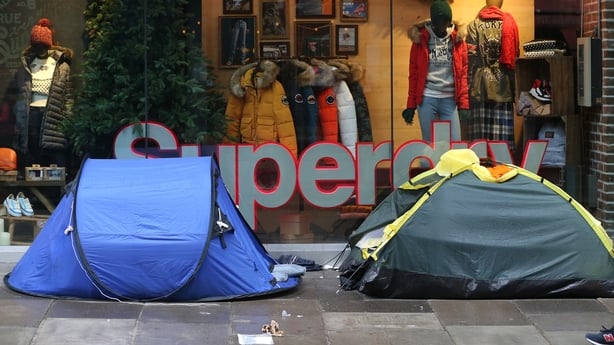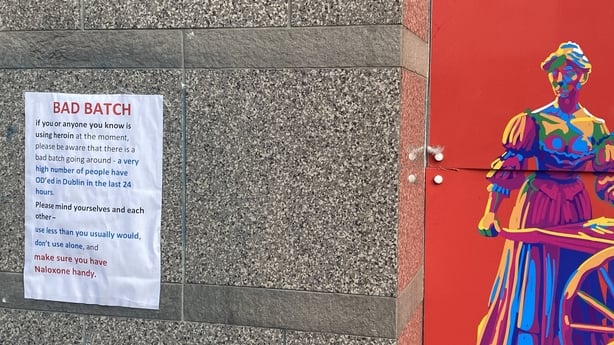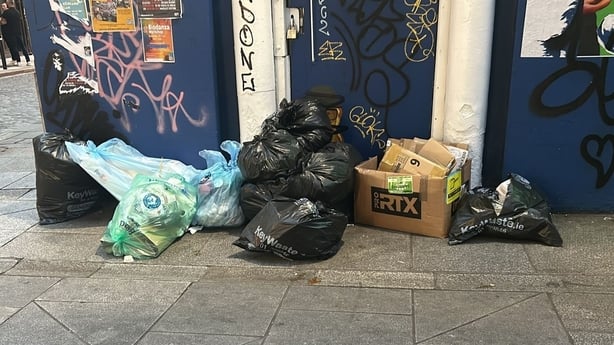“Dublin does not need a new plan”.
That is the extraordinary statement in the opening lines of the latest plan to revitalise Dublin City centre, penned by the chairman of the taskforce established by the Taoiseach to try and make the Irish capital a safe and more inviting place.
In his foreword to the report, David McRedmond, who is also the CEO of An Post, says there is “no lack of imagination or plans to improve city life”.
However, he said the objective of the taskforce “is about the delivery at scale and pace”.
What he appears to be saying is there are plenty of good plans to improve Dublin, but not much is being done to implement them.
You just have to flick to the appendix to see the proof. The report cites more than 70 documents consulted before its ten “Big Moves” to the capital were presented. And it makes no secret that some of the suggestions made are borrowed from what has gone before.
So why bother with another report? And does this one have the potential to make a difference to the capital?
The establishment of the taskforce was prompted by two major events in our recent history.
One is the Covid-19 pandemic, which nobody will dispute has changed the fabric of Dublin city centre. Remote and hybrid working have reduced daily footfall in the city, while the shift to online shopping has taken its toll on the retail sector. Resolving the decay and dereliction that blights the capital has been put on the back burner.
The other was the riots that took place on 23 November last. That event brought to the fore long-held concerns about security in the capital with people citing a feeling of being unsafe in the city centre. It also dragged the downward spiral of Dublin to the top of the political agenda.
There is a discernible ‘edge’ to Dublin City centre in recent years. Anyone who frequents the capital’s core will attest to the fact that poverty and addiction are more prominent on the streets than before and open drug dealing and consumption are extremely apparent.
The biggest headline from the report comes from the “Big Move” on security, suggesting that 1,000 extra gardaí be deployed in Dublin over the next three years.
It notes that the number of gardaí per head in the capital is lower than the European average.
The report says safety “is both a perception issue and a real issue”.
It points to the fact that crime statistics do not show increased crime rates since Covid. But it adds that antisocial behaviour is not categorised as crime and therefore may not be captured by the statistics.
The report suggests that some gardaí are carrying out non-policing work in the city centre that could be taken on by other agencies, but it does not elaborate on where this big boost in garda numbers might come from and where else might suffer as a result.
Its other suggestion on policing is the relocation of the current garda station on O’Connell Street to the GPO, which seems sensible given its central location and bounty of under utilised space.
The introduction of city wardens is also proposed as a different approach to ensuring a sense of safety.
“The visibility of softer surveillance and official presence is a feature of many European cities,” the report says.
Upgrading CCTV in problem spots is another idea that may be possible to act upon quickly but updating legislation to facilitate real time monitoring and analysis may take much longer to come to pass.
An increase in private security on public transport is also suggested.
This is in place on the Luas and currently being piloted on Dublin Bus. The inclusion of this idea in the report suggests the latter may be made permanent but it is subject to funding from the National Transport Authority.

The other “Big Move” that has the potential to bring real change to the streets of Dublin is in relation to the delivery of services for vulnerable populations in the capital’s core.
The report says that parts of Dublin “carry a disproportionate share of the provision of emergency accommodation, placing a strain on the already under resourced area”.
“Dublin is also a primary entry point for many International Protection Applicants. Concentration of vulnerable and transient cohorts risks social exclusion and exacerbation of social problems.”
To tackle this, the report suggests that cross-government agreement is required on new emergency accommodation facilities in prescribed inner-city areas.
It adds that co-ordination is needed between the four Dublin local authorities to allocate homeless services across “a wider spread”.
It also suggests that the city centre location of the International Protection Office should be reviewed and considered for re-location.
The report points to the practice of charities providing food and tents among other services on the street. It says that while it is well intentioned, it “further adds to this rise in social issues.”
“These groups are for the most part unregulated and do not have the skills or experience of engaging with people who have complex and multiple needs.
“The model of on-street delivery in high-profile locations risks the privacy, dignity and the safety of people using the service, attracts anti-social behaviour and drug dealing and degrades the public realm.”
To tackle this, the report suggests new bye laws to regulate on-street charitable services such as soup kitchens and other services.

The report says that drug use is visible in the city and that the profile of drug use in the city “has changed and services need to be dynamically adapted to meet evolving needs”.
It says it supports the Department of Health strategy which has highlighted the need to expand the spread of drug and alcohol services geographically.
It also says that mobile supervised drug consumption services should be part of an agreed response to open drug usage.
Any of the above suggestions would help tackling some of the most pronounced of Dublin’s problems. Arguably, they need to come before any of the other eight “Big Moves” would make a difference.
Security needs to be addressed before doing things like revitalising O’Connell Street by making the GPO a building with a greater public function, converting derelict sites into high density residential unit with provision for essential workers, regenerating social housing complexes or accelerating the Dubin City Transport Plan to make the city a more inviting place to live and visit.
If you look at the variety of things happening in Dublin for this coming Halloween mid-term break, it is apparent that two other “Big Moves” – offering a compelling reason to visit the city centre and creating a marketing and communication function – are things that are already being done by Dublin City Council.
The council currently holds many excellent family-friendly events throughout the year, advertises them extensively and they are well attended. Building on that success would obviously be a smart move.
Dublin’s return to its former reputation as a dirty old town is also a focus of the report.
The first steps of a dedicated waste management plan are already under way with a plan from the new year to remove bagged waste from parts of the city centre and to eventually expand that to other areas.
Plans to tackle the very obvious cleanliness problems in the capital include devoting more resources to cleaning the streets and the use of a register to find out who is not paying for services.
But one of the aspects of this report that appears to have flown under the radar is its suggestion that, in the long term, Dublin’s waste management should be brought back into the hands of the council.

It says: “The biggest contributor to litter in Dublin is the current system of multiple private providers of waste management services with their own operating processes and collection times.
“Having multiple providers of waste management services has created complexity and lack for accountability in the city centre.”
However, the report says it realises this would have to be done gradually.
“We recognise that an immediate return to municipal waste management is not feasible and may be subject to legal challenge, but moving to re-municipalisation of waste management on a phased basis should be considered in the long term.”
In the meantime, it suggests legislative changes to support the change to a single waste management provider.
The final suggestion, that of holding a plebiscite on a directly elected mayor for Dublin to govern the capital to ensure appropriate governance, is a complex one.
The issue has already been examined by a Citizens Assembly and an Oireachtas Committee but the general consensus is that the financial implications of such a move need to be clearer before such a vote could proceed.
Money will be a big factor in what happens next in with this taskforce report.
Its authors estimate it could need up to a billion euro in capital investment and 100 to 150 million a year to make the ideas outlined happen.
The Department of the Taoiseach has committed to overseeing its implementation.
Each of the actions has been assigned to various Government bodies.
The coming months will tell if these suggestions for improving Dublin, many of which have been around for some time, will actually come to pass, or if this will join other reports which imagined a better future for Dublin but did not receive the resources or the political will required to make a difference.
